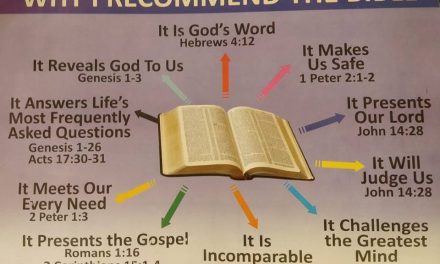Pentecost is the great festival of soul harvest rooted in the book of Acts, chapter 2, that marks the birth of the Christian Church by the power of the Holy Spirit; hence each year, Pentecost Sunday, the third Christian sacred event, comes 50 days after Easter Sunday. The first Pentecost gathering consists of the roll call of nations from every known continent, race, and group known in the first century A.D (Acts 2:5). The observance of Pentecost goes beyond the modern Pentecostal movement within Christianity, linked to the Holiness movement in early Methodism. Pentecost Sunday celebration is 1900 years older than the Azusa Street revival in Los Angeles at the turn of the 20th century.
God breathed life into the Church at Pentecost to participate in His mission. Pentecost provides a theological sequence for Church and national renewal and unity; hence, ‘theology precedes and shapes missiology, which precedes and together with theology, shapes ecclesiology.’ Nigeria and the Church in full Pentecost reflect why the Church today is not the Church of the first Day of Pentecost because we have lost the sense of the sacred for secularity.
Before the first Pentecost, on the day of the Ascension, Jesus ordered his disciples not to depart from Jerusalem but to wait for the promise of the Father. When the promise came (Pentecost), crowds from all nations, including the people who crucified Jesus, listened to Peter at Jerusalem, and there was a crucial link between habitat and habits. The different people groups, ethnes or cultures gathered in sacred affirmation of the cultural diversity and fulfilment of God’s promise. The first Pentecost changed a riotous and murderous society into a Spirit-filled and united global fellowship. When the Church was born in Jerusalem, it was a Fellowship and a mission to Africa. ‘When it went to Greece, it became a Philosophy. When it went to Rome, it became an Institution. When it went to Europe, it became a Culture. When it went to America, it became an Enterprise.’ The Church needs to return to being a Fellowship united by mission through full Pentecost, especially in Nigeria, rather than denominational enterprise and empires!
Thousands of Nigerians pilgrimage to Jerusalem every year, returning with few Pentecost practices and presence in Nigeria. When will the promise of the Father come to pass over Nigeria as a global pilgrim centre to equip people for world evangelism? What type of gospel are we preaching or ‘selling’ in Nigeria when our leaders are flying private jets whilst members travel on death trap roads and die daily through accidents? To make the gospel known in Nigeria in a post-denominational age and a truly ecumenical age, the Church in full Pentecost must link our habitats – environment and habits – personal holy practices as a way of life, leadership, and governance. The early Church in full Pentecost was not just filled with a sense of the sacred; they prioritised it. Today, we have chosen differently, a world filled with the babble of the voices of advertisement and consumerism. We have to admit that there is little difference between people who go to Church and those who do not: Christian leaders and political looters. The Church has become an idol where lives are aligned around something or someone else.
The Church in full Pentecost is about the revolution that does not need to be announced but enacted through demonstration of God’s intention for the people and scriptural holiness. The revolution must start in the Church by breaking denominational egos and laying down every false image of self for true identity in Christ.
Nigeria is in ‘blackouts’ because ‘good things’ have replaced the Good News and God as the manual and object of our worship and mission. The blackouts are not only caused by PHCN or lack of oxygen in the human brain but spiritual and political blackouts caused by periods of amalgamated unconsciousness, lack of awareness, lack of unity, and elitist/egoistic democracy. One problem is that our elites only see the problem when they leave the office but always justify their actions when in office. The tragic and harmful effect is leaving the individual and nation with a distorted orientation, poverty, politically sponsored terrorists, militants, abnormal death rates, and kidnapping. The cup of Nigeria’s corruption-induced blackouts is becoming full of an impending political and spiritual avalanche that carries the threat that could destroy everyone. Medical experts explained that memory loss from blackouts can be recovered and that it can also lead to more problems. For Nigeria to recover and escape from more problems, the Body of Christ in Nigeria, as the agent of social change, sign, instrument, and foretaste of God’s kingdom, needs to return to full Pentecost, a renewal in the fullness of the power of the Holy Spirit.
Nigeria’s blackouts are very contagious. The Church is not left out of the prevailing sin-impregnated norms of thought, culture, and behaviour, though many are oblivious to the dangers on the horizon. On the church blackout, the reference points—the ancient landmarks, full Pentecost — have been eroded. Erroneous teachings have merged with truth, wooing and causing innocent people to become disoriented, unbelieving believers. While the nation is searching for reformers for national renewal/good governance and how to institute righteousness in every sector of our national life, the Church is seeking more titles, billionaires, and the other ‘good things’ of life. Godliness is not a means of gain (1 Tim.6:5). Money is not our problem but full Pentecost men and women in our leadership. The Church is the prophetic/counter-cultural pilgrims’ call to discern the signs of God’s activity within contemporary events.
The spiritual blackout spreading through the divided, unbalanced and, in some cases, unbiblical teaching hinders the full Pentecost and traditional truth of Christ, producing consumers rather than disciples. Divided churches buttressed by centuries of prejudice and unholy competition cost lives, but the Church in full Pentecost unites to save life and overcome the walls of ecclesiastical/doctrinal and habitats/habits disconnection. The overemphasis on prosperity, the exaggerated view of grace through hype-teaching, the deification of man and what Bishop T D Jakes called the ‘Hollywood Spirit’ have become an epidemic and overtaken the Church. People-oriented teachings have entered the Church in various ways. Sometimes, biblical truth is taught to the exclusion of other biblical truths, thereby producing a dangerous, imbalanced Christian generation. At other times, biblical truth is taught exaggeratedly, often going beyond what Scripture says, and in the end, this does more harm than good. Often explicit, biblical warnings are ignored or reinterpreted so radically that they lose all impact of holiness, leaving people vulnerable and exposed. Just like in our political system, the Church in Nigeria is in grave danger of gazing upon man rather than God. The worship of man is a setup for the Antichrist, as we become so accustomed to worshipping man or political party.
The Church in full Pentecost is the light that draws the world to salvation in Jesus’ name. But how can the Church in Nigeria achieve this vision when the world sees inside our walls the same ugly worldliness, corruption, and division as in the rest of society? Pentecost Sunday calls for the Church’s repentance and renewal toward NIGERIA’S FULL PENTECOST.











Recent Comments